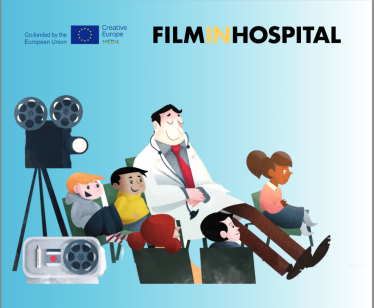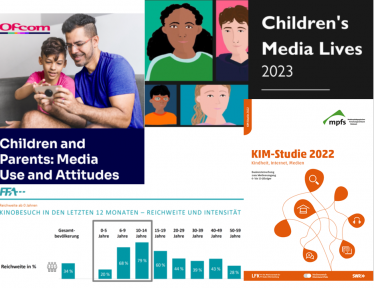 The REBOOT project – Reviving, Boosting, Optimising and Transforming European Film Competitiveness, is a new Horizon research project launched in summer 2023, focusing on empowering European film competitiveness and national policies. Headed by the University of Vienna in partnership with 11 universities (9 EU and 3 non-Eu countries), the project aims to connect the existing strengths, to identify and overcome weaknesses and plan for future competitiveness in the fields of film policy, practice and experience, towards providing a full set of knowledge of the European film industry.
The REBOOT project – Reviving, Boosting, Optimising and Transforming European Film Competitiveness, is a new Horizon research project launched in summer 2023, focusing on empowering European film competitiveness and national policies. Headed by the University of Vienna in partnership with 11 universities (9 EU and 3 non-Eu countries), the project aims to connect the existing strengths, to identify and overcome weaknesses and plan for future competitiveness in the fields of film policy, practice and experience, towards providing a full set of knowledge of the European film industry.
Author: Margret Albers
Methods for engaging young audiences in health-care structures
 The European project “Film in Hospital”, managed by 6 ECFA members, presents inspiring results of their research activity in a booklet. Il Nuovo Fantarca and the Università Cattolica del Sacro Cuore, through its two research centres OssCom and Cremit, ran this research in 2022/2023
The European project “Film in Hospital”, managed by 6 ECFA members, presents inspiring results of their research activity in a booklet. Il Nuovo Fantarca and the Università Cattolica del Sacro Cuore, through its two research centres OssCom and Cremit, ran this research in 2022/2023
Continue reading “Methods for engaging young audiences in health-care structures”
New book on audiovisual content for children and young audiences in Scandinavia
 This free to download edited collection from Nordicom offers new perspectives on film and television for children and adolescents based on case studies of commissioning strategies, production frameworks, screen stories, and media use in Denmark, Norway and Sweden.
This free to download edited collection from Nordicom offers new perspectives on film and television for children and adolescents based on case studies of commissioning strategies, production frameworks, screen stories, and media use in Denmark, Norway and Sweden.
Continue reading “New book on audiovisual content for children and young audiences in Scandinavia”
Danish films for children and youth in the 2000s
 A special issue of the Danish film journal Kosmorama focuses on Danish films for children and youth in the 2000s. The introduction and first chapter discuss recent trends as well as current challenges in a small nation film culture with 25% of the public film financing earmarked for children and adolescents, based on findings from an investigation of the films supported by the Danish Film Institute since 2000 as well as a number of interviews with people working with children’s films in Denmark (published as individual interviews in the issue).
A special issue of the Danish film journal Kosmorama focuses on Danish films for children and youth in the 2000s. The introduction and first chapter discuss recent trends as well as current challenges in a small nation film culture with 25% of the public film financing earmarked for children and adolescents, based on findings from an investigation of the films supported by the Danish Film Institute since 2000 as well as a number of interviews with people working with children’s films in Denmark (published as individual interviews in the issue).
Continue reading “Danish films for children and youth in the 2000s”
Children’s Media Lives in different European Countries
 Data on children’s viewing habits is useful for both the development and distribution of children’s films. We therefore take a look here at irregular intervals at qualitative or quantitative studies that are dedicated to children’s media life in various countries. After Denmark, now Germany and Great Britain.
Data on children’s viewing habits is useful for both the development and distribution of children’s films. We therefore take a look here at irregular intervals at qualitative or quantitative studies that are dedicated to children’s media life in various countries. After Denmark, now Germany and Great Britain.
Continue reading “Children’s Media Lives in different European Countries”
7–18-year-olds and their lives with films, series, and social media

If one wants to learn more about the media use of children and young people, there are many interesting insights in a new report with qualitative research conducted by Will & Agency for The Danish Film Institute.
Continue reading “7–18-year-olds and their lives with films, series, and social media”
Children as documentarians of the COVID-19 pandemic
 This chapter from the book Documentary in the Age of COVID investigates the making of the film Dengang Danmark lukkede ned (Lockdown – A Children’s Story, 2020) which was initiated by the children’s film festival Buster and The National Museum of Denmark with the intention to have Danish children document and share their experience of life during lockdown.
This chapter from the book Documentary in the Age of COVID investigates the making of the film Dengang Danmark lukkede ned (Lockdown – A Children’s Story, 2020) which was initiated by the children’s film festival Buster and The National Museum of Denmark with the intention to have Danish children document and share their experience of life during lockdown.
Continue reading “Children as documentarians of the COVID-19 pandemic”
The relationship between film education and European arthouse cinema

This article by Petar Mitric from the journal Studies in European Cinema investigates how film education can make European arthouse cinema more sustainable in both cultural and industrial terms.
Continue reading “The relationship between film education and European arthouse cinema”
